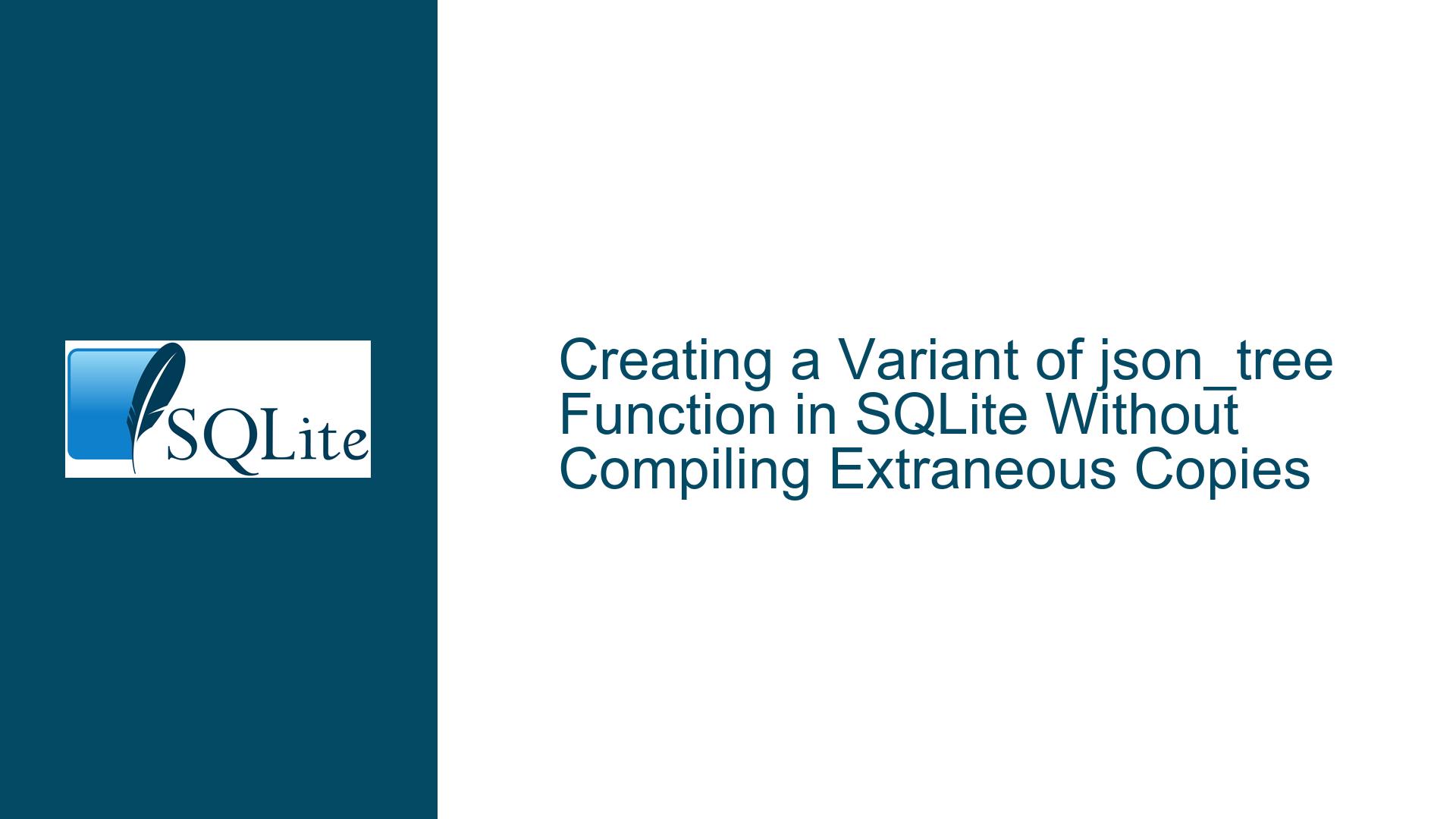Creating a Variant of json_tree Function in SQLite Without Compiling Extraneous Copies
Issue Overview: Compiling a Variant of json_tree Function in SQLite Without Duplicating Core Libraries
The core issue revolves around the challenge of creating a variant of the json_tree function in SQLite without compiling an extraneous copy of SQLite into an application, particularly when the operating system (iOS 16 in this case) already provides SQLite as a system library. The primary obstacle is that the json.c module, which contains the json_tree function, relies on internal SQLite data types, macros, and functions that are not exposed through the public API (sqlite3.h or sqlite3ext.h). This dependency necessitates access to internal headers such as sqliteInt.h, which in turn requires including a cascade of other internal headers, leading to a complex and potentially problematic compilation process.
The json_tree function is part of SQLite’s JSON1 extension, which was originally a loadable extension but has since been integrated into the SQLite core. This integration means that json.c now depends on core SQLite internals, making it difficult to compile in isolation. The goal is to avoid duplicating SQLite’s core code within the application while still being able to modify or extend the json_tree function. This is particularly important for applications that must adhere to strict binary size constraints or those that aim to leverage the system-provided SQLite library for consistency and performance reasons.
Possible Causes: Dependency on Internal SQLite Types and Macros
The root cause of the issue lies in the deep integration of the JSON1 extension into SQLite’s core. When the JSON1 extension was a loadable module (json1.c), it was designed to be self-contained and could be compiled separately from the core SQLite library. However, as part of the core, json.c now relies on internal SQLite data types (e.g., u64, sqlite3_context) and macros (e.g., sqlite3_free via sqlite3_api->free) that are not part of the public API. These dependencies are defined in internal headers such as sqliteInt.h, which are not intended for use outside of SQLite’s core compilation process.
The reliance on internal headers creates a cascading dependency problem. Including sqliteInt.h requires including other internal headers, each of which may have its own dependencies. This makes it impractical to compile json.c in isolation without also including a significant portion of SQLite’s core code. Additionally, the use of macros like sqlite3_api->free introduces a dependency on the SQLite API structure, which is initialized at runtime and is not available during the compilation of standalone modules.
Another contributing factor is the evolution of SQLite’s architecture. The integration of the JSON1 extension into the core was likely done to improve performance and reduce the overhead of loadable extensions. However, this architectural change has made it more difficult to modify or extend the JSON functionality without recompiling the core SQLite library. This is particularly problematic for developers who need to customize SQLite’s behavior but cannot or do not want to include a separate copy of SQLite in their application.
Troubleshooting Steps, Solutions & Fixes: Strategies for Isolating and Modifying json_tree Function
To address the issue of creating a variant of the json_tree function without compiling an extraneous copy of SQLite, several strategies can be employed. Each approach has its own trade-offs and complexities, and the best solution will depend on the specific requirements and constraints of the project.
1. Using the Old Loadable json1.c Module
One approach is to revert to the older, loadable json1.c module, which was designed to be compiled separately from the SQLite core. This module does not rely on internal SQLite headers and can be compiled as a standalone extension. By starting with json1.c, you can avoid the dependencies on internal SQLite types and macros, making it easier to create a variant of the json_tree function.
However, this approach has some limitations. The json1.c module may not include the latest bug fixes and improvements that have been made to the JSON functionality in the core json.c module. To address this, you can manually apply the relevant changes from the core json.c module to your modified json1.c module. This process involves comparing the two versions of the code and selectively incorporating the changes that are relevant to your use case.
To facilitate this, you can use the check-in diff provided in the SQLite source repository, which shows the changes made when json.c was integrated into the core. This diff can serve as a guide for identifying the specific changes that need to be applied to json1.c. While this approach requires some manual effort, it allows you to maintain compatibility with the system-provided SQLite library while still benefiting from the latest improvements to the JSON functionality.
2. Modifying json.c to Use Public API Only
Another approach is to modify the json.c module to remove its dependencies on internal SQLite types and macros, making it compatible with the public API. This involves replacing the internal types and macros with equivalent constructs that are available through sqlite3.h or sqlite3ext.h.
For example, the u64 type, which is used internally by SQLite, can be replaced with a standard C type such as unsigned long long. Similarly, macros like sqlite3_free can be replaced with direct calls to the corresponding functions in the public API. This approach requires a thorough understanding of the SQLite public API and may involve significant changes to the json.c module.
One challenge with this approach is that some internal types and macros may not have direct equivalents in the public API. In such cases, you may need to implement custom replacements or workarounds. Additionally, this approach may introduce subtle differences in behavior compared to the original json.c module, particularly if the internal types and macros have specific optimizations or behaviors that are not replicated in the public API.
3. Compiling a Custom SQLite Amalgamation
If modifying json.c to use the public API is not feasible, another option is to compile a custom SQLite amalgamation that includes your modified json.c module. The SQLite amalgamation is a single file (sqlite3.c) that contains the entire SQLite library, including the core and all extensions. By creating a custom amalgamation, you can include your modified json.c module while still leveraging the system-provided SQLite library for other parts of your application.
To create a custom amalgamation, you can start with the standard SQLite amalgamation and replace the core json.c module with your modified version. This approach allows you to maintain compatibility with the system-provided SQLite library while still being able to customize the JSON functionality. However, it does require compiling and linking a separate copy of SQLite, which may increase the size of your application and introduce potential compatibility issues with the system-provided library.
4. Leveraging SQLite’s Loadable Extension Mechanism
If your goal is to create a variant of the json_tree function that can be dynamically loaded as an extension, you can leverage SQLite’s loadable extension mechanism. This involves creating a new extension module that implements the desired functionality and can be loaded at runtime using the sqlite3_load_extension function.
To create a loadable extension, you need to follow the guidelines provided in the SQLite documentation, particularly the "Programming Loadable Extensions" section. This includes using the sqlite3ext.h header file and defining the necessary entry points for the extension. The extension can then be compiled as a separate shared library and loaded into SQLite at runtime.
One advantage of this approach is that it allows you to create a self-contained extension that does not rely on internal SQLite types and macros. However, it does require that the extension be compatible with the version of SQLite provided by the system, and it may not be suitable for all use cases, particularly if the extension needs to interact closely with the core SQLite functionality.
5. Conditional Compilation and Preprocessor Directives
Another strategy is to use conditional compilation and preprocessor directives to selectively include or exclude parts of the json.c module based on whether it is being compiled as part of the core or as a standalone module. This approach involves adding #ifdef directives to the json.c module to conditionally include internal headers or use alternative implementations when compiling in isolation.
For example, you can define a preprocessor macro (e.g., STANDALONE_JSON) that is set when compiling the json.c module in isolation. This macro can then be used to conditionally include alternative implementations of internal types and macros or to exclude parts of the code that rely on internal SQLite headers. This approach allows you to maintain a single codebase for the json.c module while still being able to compile it in different contexts.
However, this approach can make the code more complex and harder to maintain, particularly if there are many conditional compilation directives. It also requires careful testing to ensure that the module behaves correctly in both standalone and core compilation contexts.
6. Creating a Wrapper Function
If the goal is to modify the behavior of the json_tree function without changing its implementation, you can create a wrapper function that calls the original json_tree function and modifies its output or behavior as needed. This approach involves creating a new function that takes the same parameters as json_tree, calls the original function, and then applies the desired modifications to the result.
This approach is particularly useful if the modifications to the json_tree function are relatively simple and do not require access to internal SQLite types or macros. However, it may not be suitable for more complex modifications that require changes to the internal logic of the json_tree function.
7. Using SQLite’s Virtual Table Mechanism
If the goal is to extend SQLite’s JSON functionality without modifying the core json.c module, you can use SQLite’s virtual table mechanism to create a custom JSON virtual table. A virtual table is a user-defined table that can be queried like a regular SQLite table but is implemented in code rather than being stored in the database file.
By creating a custom JSON virtual table, you can implement the desired JSON functionality in a way that is independent of the core json.c module. This approach allows you to extend SQLite’s JSON capabilities without modifying the core library or creating a separate copy of SQLite. However, it does require a significant amount of work to implement the virtual table and may not be suitable for all use cases.
8. Exploring Alternative JSON Libraries
If the goal is to add JSON functionality to an application without relying on SQLite’s built-in JSON support, you can explore alternative JSON libraries that can be used alongside SQLite. There are many open-source JSON libraries available for C and other programming languages that provide similar functionality to SQLite’s JSON1 extension.
By using an alternative JSON library, you can avoid the complexities of modifying SQLite’s core JSON functionality and instead implement the desired JSON features in your application code. This approach allows you to maintain compatibility with the system-provided SQLite library while still being able to customize the JSON functionality as needed. However, it does require integrating the alternative JSON library into your application and may introduce additional dependencies.
9. Consulting SQLite’s Documentation and Community
Finally, if none of the above approaches are suitable, you can consult SQLite’s documentation and community for additional guidance. The SQLite documentation provides detailed information on the public API, loadable extensions, and virtual tables, as well as best practices for extending and customizing SQLite. Additionally, the SQLite community, including forums and mailing lists, can be a valuable resource for getting help with specific issues and learning from the experiences of other developers.
By leveraging the knowledge and expertise of the SQLite community, you can gain insights into the best practices for creating variants of SQLite functions and avoiding common pitfalls. This can help you find a solution that meets your specific requirements while minimizing the impact on your application and development process.
Conclusion
Creating a variant of the json_tree function in SQLite without compiling an extraneous copy of the core library is a complex task that requires careful consideration of the dependencies and constraints involved. By understanding the root causes of the issue and exploring the various strategies outlined above, you can find a solution that meets your specific needs while maintaining compatibility with the system-provided SQLite library. Whether you choose to use the old loadable json1.c module, modify json.c to use the public API, or explore alternative approaches, the key is to carefully evaluate the trade-offs and choose the approach that best aligns with your project’s goals and constraints.






